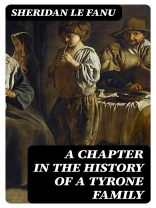In ‘A Chapter in the History of a Tyrone Family, ‘ Sheridan Le Fanu intricately weaves a narrative that delves into the complexities of familial legacy amidst the backdrop of the Irish social landscape. The text employs a rich, descriptive literary style, effectively blending the gothic elements characteristic of Le Fanu’s oeuvre with a poignant exploration of identity and memory. The story encapsulates the interplay between personal and historical narratives, resonating with the themes of nostalgia and loss that permeate 19th-century Irish literature. Sheridan Le Fanu, a pivotal figure in the development of gothic fiction, was deeply influenced by the cultural and social dynamics of his time. Having immersed himself in the tumultuous Irish context, especially the ramifications of colonialism and familial strife, Le Fanu’s writing reflects both personal experiences and broader societal concerns. His fascination with the supernatural and the uncanny can be traced through his works, making them not just narratives, but explorations of the human condition. This book is an essential read for those interested in gothic literature and the exploration of familial relationships within historical contexts. Le Fanu’s masterful storytelling invites readers to reflect on the enduring impact of heritage and the haunting questions surrounding identity. For both scholars and casual readers alike, it offers a captivating glimpse into the intricate tapestry of Irish history.
Despre autor
Joseph Sheridan Le Fanu was an esteemed Irish writer, known for his significant contributions to the gothic horror genre. Born on August 28, 1814, in Dublin, Ireland, Le Fanu hailed from a literary family which influenced his future as a storyteller. He studied law at Trinity College Dublin but his passion for writing led him to a career in journalism and later as a prolific author. Le Fanu became the proprietor of several newspapers, including the ‘Dublin University Magazine’, where he would often publish his own works. His legacy as a master of mystery and the supernatural is built on his unique ability to meld the gothic with the realities of Irish society. ‘A Chapter in the History of a Tyrone Family’ is a classic example of his craft. It showcases Le Fanu’s skillful use of first-person narrative and serves as a precursor to his more famous works, such as ‘Uncle Silas’ and ‘Carmilla’. These novels have etched his name in literary history and have influenced many subsequent authors in the horror and mystery genres. Le Fanu’s use of psychological terror and the subtle buildup of suspense rather than overt horror set his style apart from his peers. Despite his death on February 7, 1873, Le Fanu’s stories continue to be a staple for those seeking the thrilling chill of gothic fiction.












